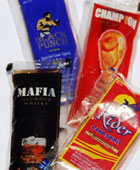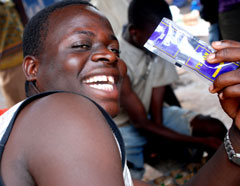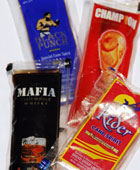Health versus profits:
Conflict over liquor sachets in Malawi
Malawi now experiences a conflict over liquor sachets. Government and NGOs versus alcohol producers. Health versus profits. Also other countries in Africa face problems with the small plastic bags with strong liquor.
 A few years ago a variety of small plastic sachets with 40 % spirits were introduced to the market place in a number of African countries. Now problems have become very visible from the sale and use of such alcoholic beverages, in particular among the youth and the poor. This has resulted in public outcry and political discussions in an attempt to do something to the problem.
A few years ago a variety of small plastic sachets with 40 % spirits were introduced to the market place in a number of African countries. Now problems have become very visible from the sale and use of such alcoholic beverages, in particular among the youth and the poor. This has resulted in public outcry and political discussions in an attempt to do something to the problem.
In Malawi there was an encouraging political process last year which aimed at banning the sale of liquor in plastic sachets. Now, as a result of a court decision, the process has stalled. Governments and NGOs have their hands tied up by the court injunction, while the strong liquor continues to be sold to minors, through legal and illegal channels.
 The problem with liquor sachets sold to minors was described by the participants at a regional alcohol policy consultation meeting in Chikhwawa in the Southern part of Malawi. The headmaster of Livuzu Secondary School, Mrs P. Simbota (picture right), said: “Alcohol simply affects negatively the quality of our education system. These sachets contain liquor with a high alcohol content and they are sold at a low price. Students sip from these sachets also during lessons, as the sachets are small and easy to hide. Some even mix the content with ordinary water or juice and conceal their dangerous habit by that.”
The problem with liquor sachets sold to minors was described by the participants at a regional alcohol policy consultation meeting in Chikhwawa in the Southern part of Malawi. The headmaster of Livuzu Secondary School, Mrs P. Simbota (picture right), said: “Alcohol simply affects negatively the quality of our education system. These sachets contain liquor with a high alcohol content and they are sold at a low price. Students sip from these sachets also during lessons, as the sachets are small and easy to hide. Some even mix the content with ordinary water or juice and conceal their dangerous habit by that.”
The introduction of strong liquor in small plastic bags is an attempt by the alcohol beverage industry, both local and multinational companies and in a number of countries, to find new market segments and to recruit new consumers. The sachets are sold at a very low price, so that many can afford them, including youth and poor people. One bag contains the equivalent of whiskey, vodka etc in a standard drink. The price of such a sachet in Malawi may be as low as 10 Malawian kwacha in the most extreme cases. This is equivalent to 7-8 US cents, which even for a poor Malawian is a low price. Often the sachets are sold through unlicensed outlets and to minors.
As an attempt to convince customers that these sachets are powerful and masculine products they have been given very impressing brand names: Boss, Power’s No 1, Rider, Mafia, Champion and Black Punch!
In Malawi it has also been disclosed that some producers have mixed non-food alcohol meant for export in the liquor sachets. Such alcohol is exempted from some domestic taxes and therefore obtained at a low cost. This helps to keep prices low and profits higher. One Blantyre-based company was closed down by the authorities because of use of ethanol not meant for consumption in their production of liquor sachets.
 Many Malawians have experienced the problems linked to alcohol in plastic bags, in particular among youth. NGOs and also politicians and government agencies have demanded that something should be done. The Ministry of Industry and Trade reported that from early 2010 there was an increased outcry from the general public. In particular parents were worried about the increased use of sachets mainly by boys of school going age. It was also pointed to an alarming trend that minibus drivers and conductors were using liquor from sachets and thus putting lives of passengers at risk.
Many Malawians have experienced the problems linked to alcohol in plastic bags, in particular among youth. NGOs and also politicians and government agencies have demanded that something should be done. The Ministry of Industry and Trade reported that from early 2010 there was an increased outcry from the general public. In particular parents were worried about the increased use of sachets mainly by boys of school going age. It was also pointed to an alarming trend that minibus drivers and conductors were using liquor from sachets and thus putting lives of passengers at risk.
After consultation with the industry and other stakeholders the Malawian Bureau of Standards (MBS) decided in June 2010 to ban the sale of liquor in plastic bags. The decisions provided that all liquor must be sold in glass bottle and that MBS should define a minimum size of such containers. The producers were given a six months grace period to phase out the use of plastic containers and to introduce glass bottles.
The grace period ended 17th January this year. However, the ban could not be enforced by the government. One of the distilling companies, Abwensi Group which produces the Rider brand of spirits, had obtained a court injunction which restrains the MBS to enforce the ban of sachets on its company.
Now the case is in the hands of lawyers, while liquor sachets continue to be sold.
RELATED ARTICLES
- New report highlights benefits of policy measures to prevent harmful alcohol consumption
- Alcohol use - a barrier to health and to the achievement of the SDGs
- Government investments in alcohol industry up against the wall
- Abstracts for GAPC 2020 – deadline 29 July 2019
- Involve young people as partners in prevention!
- A regional African alcohol coordination mechanism is needed
- New book reveals a series of unethical business practices by Heineken in Africa
- Next GAPC to be held in Dublin in March 2020
- SAFER – a new WHO initiative to boost national alcohol policy processes
- Trouble Brewing

